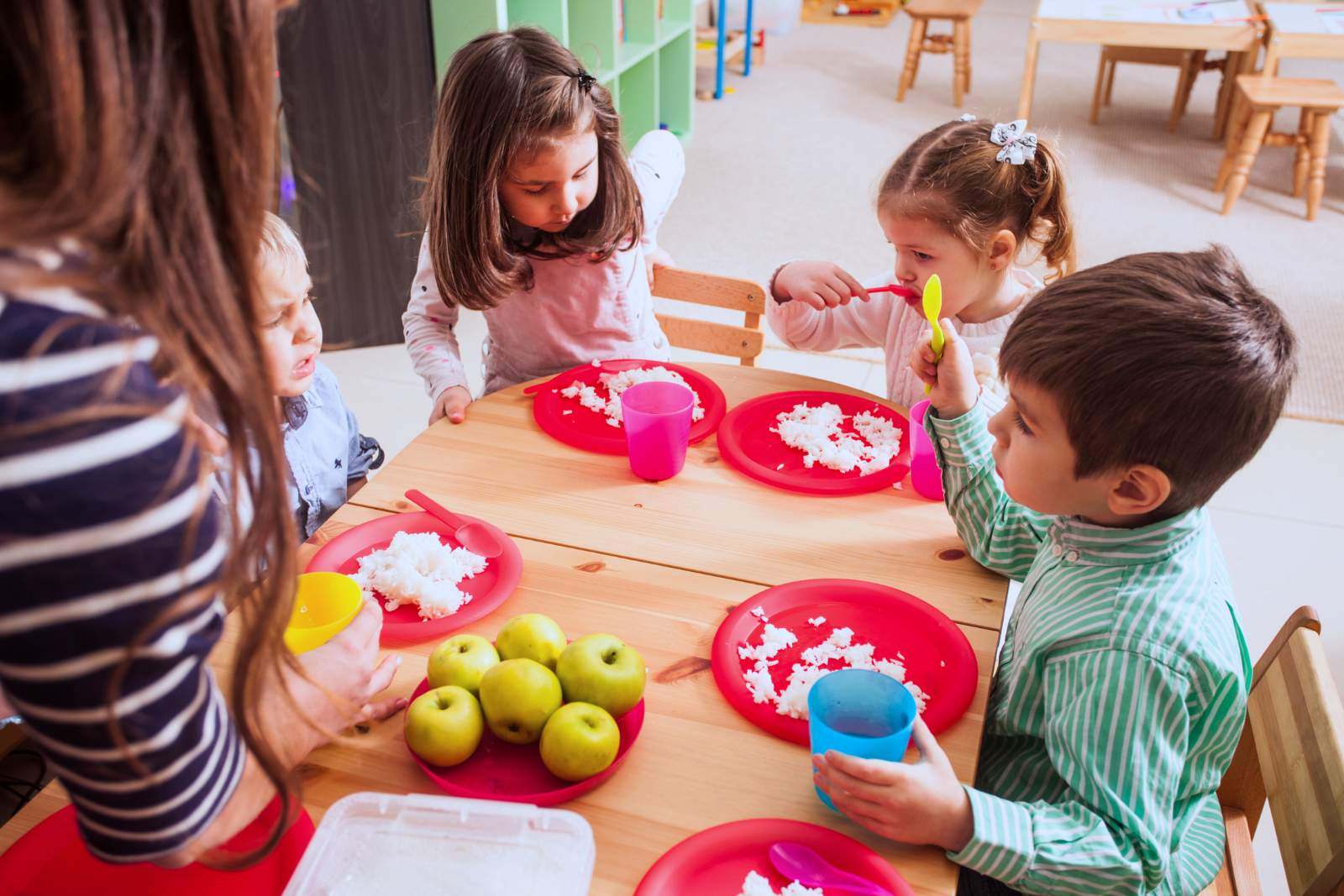We only hear conversations about food safety in childcare facilities when something goes wrong.
However, with approximately 59% of children under five in a nonparental care arrangement at least once a week, there is a significant need for professionals who understand food safety in a childcare setting.1
If you’re curious about the regulations and best practices behind foodservice in childcare, this post is for you! In this article, we’ll cover:
Why is food safety so important in childcare?
How is food safety regulated in U.S. childcare facilities?
How can you promote food safety in childcare facilities?
Food safety for infant formula
Food allergies and young children
Why is food safety so important in childcare?
Food safety is critical in any foodservice establishment. However, the stakes are much higher in childcare because children are a vulnerable population–and they need to eat frequently to support healthy development!
Children under five are considered high-risk because their bodies are still developing, so they are not as prepared to fight pathogens. Typical symptoms of a foodborne illness, like vomiting and diarrhea, can quickly lead to life-threatening complications.
Moreover, since many food allergies first appear in childhood, a child’s first allergic reaction may occur in a childcare setting.
How is food safety regulated in U.S. childcare facilities?
The U.S. Department of Agriculture (USDA), the U.S. Food and Drug Administration (FDA), and other government agencies oversee the regulations and monitoring systems that ensure food safety in childcare facilities.
The most critical regulations cover proper licensing, background checks, child-to-staff ratios, health and safety requirements, staff qualifications, and monitoring and inspection of facilities.2,3
There are two main types of childcare facilities: childcare centers and in-home care. In-home care often has less strict regulations, though this varies by state and local jurisdiction.4
States and territories use these federal requirements to establish more specific regulations for childcare facilities.
For example, Indiana centers must serve three meals plus two snacks in between. However, in Illinois, meal schedules are determined by how long a child is present. California requires only one hour of nutrition training for in-home caretakers, while New York requires in-home daycares to adhere to two dozen regulations.
Childcare regulations are nuanced and vary across the country. If you are looking to open a childcare business or simply begin working in the field, it is critical to understand your state’s specific requirements.
Staff qualifications and training
As children depend on adults to keep them safe, childcare workers often don’t just provide food.
You may have to be ready to perform CPR, know what steps to take if a child has an allergic reaction, administer medication, and recognize the importance of safely storing medications.
Visit the National Database of Child Care Licensing Regulations for a comprehensive list of state-by-state regulations, or contact your local authority.5
The USDA Food and Nutrition Service Staff notes that a designated person in charge is a critical staff member who must be present during all hours of operation.
How can you promote food safety in childcare facilities?
The USDA and Partnership for Food Safety Education summarizes some of the essentials in their Fight Bac!® Program: clean (wash hands and surfaces often), separate (avoid cross-contamination), cook (prepare food to the proper temperature), and chill (refrigerate foods promptly).6
Training and education
If you’re new to the industry (or looking for continuing education), consider formal training in safe food handling practices or even allergen awareness. Arriving at an interview with these trainings under your belt shows that you’re serious about protecting children from the dangers of foodborne illness and allergic reactions.
Personal hygiene
When it comes to childcare, remember that hygiene is not limited to your own personal hygiene.
Caretakers assist and teach children how to wipe their noses. They help kids reach the sink to wash their hands. They may change diapers or clothing.
Teaching healthy hygiene habits may be a part of your job, too!
Food safety for infant formula
Infant formula is highly regulated since it is sometimes the sole nutrition source for infants.
Treat formula like any other food and consider the best practices. Develop good relationships with suppliers so you can trust that the infant formula is manufactured correctly, processed, packed, and held before it even enters your facility.
Once the formula arrives at your establishment, you are responsible for handling it safely. Use clean hands when preparing, sterilizing, cleaning, and sanitizing bottles. Always mix formula with safe water.
Implement the “First In, First Out” (FIFO) Method: store the oldest items at the front of the shelves so they get used first.
Stocking formula correctly isn’t just about avoiding waste. Infant formula is the only food that federal law explicitly requires a “use by” date code.7
A note on Cronobacter
Cronobacter is a common germ found in water and dry foods (like powdered infant formula). This common pathogen can lead to sepsis and meningitis in infants, which can be deadly.
Always ensure you and your staff follow storage and handling guidelines carefully. Review the standards set forth by the FDA and your local jurisdictions to cover all your bases.
Food allergies and young children
Food allergies are another major concern in childcare settings, since young kids are more likely to experience their first allergic reactions before they even reach school age. The most common food allergens account for the majority of reactions in young kids:
- Milk: Cow’s milk, cheese, yogurt, butter, and foods containing dairy ingredients.
- Eggs: Baked goods, mayonnaise, pasta, custards, and breaded foods.
- Peanuts: Peanut butter, some baked goods, candy, sauces, and snack bars.
- Tree Nuts (such as almonds, walnuts, cashews): Nut butters, granola, cookies, and some dairy-free milk alternatives.
- Soy: Tofu, soy milk, edamame, processed meats, and many packaged foods.
- Wheat: Bread, pasta, cereal, crackers, and baked goods.
- Fish: Breaded fish sticks, tuna casserole, and sauces like Worcestershire.
- Shellfish: Shrimp, crab, lobster, and mixed dishes like paella or gumbo.
Be intentional when managing allergens in your establishment; read labels, prevent cross-contact, and have an emergency plan in place for reactions.
FAQ
Why are children under five considered a high-risk population for foodborne illness?
Children under five are high-risk because their immune systems are still developing, making them less capable of fighting off pathogens. Symptoms like vomiting and diarrhea can escalate quickly into life-threatening complications for this age group.
How does food safety regulation differ between childcare centers and in-home care?
Generally, in-home care facilities face less strict regulations compared to larger childcare centers, though this varies significantly by state. For example, some states require extensive regulations for in-home daycares, while others may only require minimal nutrition training.
What is the Fight Bac!® Program?
The Fight Bac!® Program is an initiative summarized by the USDA and Partnership for Food Safety Education. It focuses on four core practices: Clean (washing hands and surfaces), Separate (avoiding cross-contamination), Cook (heating food to proper temperatures), and Chill (refrigerating food promptly).
What is the FIFO method and why is it used for infant formula?
FIFO stands for "First In, First Out." It is an inventory method where you store the oldest items at the front of the shelf so they are used first. This is critical for infant formula to prevent expiration, as formula is the only food federally required to have a "use by" date code.
What is Cronobacter and where is it found?
Cronobacter is a germ often found in dry foods, including powdered infant formula, and water. It is dangerous because it can cause severe infections like sepsis and meningitis in infants.
Do childcare workers need specific food safety training?
While requirements vary by state, obtaining formal training in food handling and allergen awareness is highly recommended. It demonstrates a commitment to safety and helps workers manage risks like allergic reactions and foodborne illnesses effectively.
Final thoughts
In a world where many, if not most, children receive care beyond the walls of their homes, protecting their safety and well-being (especially when it comes to food) is of utmost importance.
As a vulnerable population susceptible to foodborne illnesses, children in childcare facilities require meticulous attention to food safety and allergen practices.
Do you need to brush up on your food safety education? Consider Trust20’s ANAB-accredited trainings to help you keep the kiddos in your care as healthy as can be.
Sources:
-
National Center for Education Statistics: Fast Facts
-
Administration for Children and Families: What is Child Care Licensing?
-
Administration for Children and Families: Health and Safety Requirements
-
Kansas State University: Food Safety Regulations and Operations for Childcare Programs
-
Administration for Children and Families: National Database of Child Care Licensing Regulations
-
USDA Partnership for Food Safety: Fight Bac!® Program
-
USDA: Ask USDA






-1.png)
.png)
